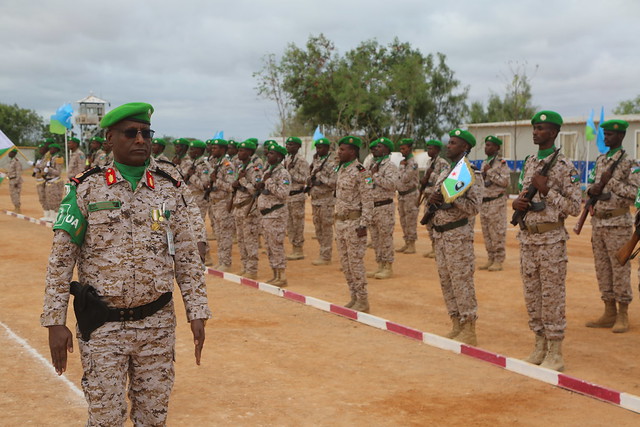Djibouti troops serving with the African Union Transition Mission in Somalia (ATMIS) celebrated their country’s 47th Independence Day in a colourful ceremony on Thursday in Beletweyne, the Hiiran region.
On June 27 every year, Djibouti celebrates its independence from French colonial rule, which was achieved in 1977.

In his address, the ATMIS Sector Four Commander, Col. Said Waberi Harour, commended the Djibouti National Defence Forces (DNDF) for their dedication and contributions to the country’s freedom.
“We remember those who sacrificed their lives to defend our freedom and protect our land. Their sacrifices inspire us to soar higher and adhere to the values that make our nation great,” he said.
He acknowledged the troops’ commitment to safeguarding the country’s sovereignty and their exceptional professional service in peacekeeping missions.
“Let’s not forget that our contributions today will determine our collective future. We are proud of the work accomplished so far, and we remain committed to ensuring security, stability and peace in our brotherly nation, Somalia,” observed Col. Waberi.
The Governor of Hiiran region, Musa Salat Wehliye, affirmed the readiness of the Somali National Army (SNA) to take over the region’s security responsibilities when Djibouti troops hand over Forward Operating Bases in the region, as part of the ongoing phase three drawdown.
“On behalf of the Federal Government of Somalia (FGS) and Hirshabelle State, I assure you that there will be no security vacuum and our Somali National Army troops are ready to assume the security responsibilities when several Forward Operation Bases (FOBs) in Hiiran region are formally handed over,” noted Governor Wehliye.
Deployed in Somalia as part of the African Union forces, Djibouti troops operate in ATMIS Sector Four Area of Responsibility (AoR) together with Ethiopian forces. Djibouti troops play a significant role in degrading Al Shabaab and restoring peace and stability in the Hiraan and Galgaduud regions.
Present at the event were senior officials from the UN, ATMIS, the Hiiran regional administration and representatives from the local community.
